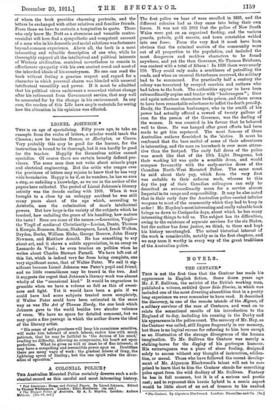LIONEL JOHNSON.* THIS is an age of specializing. Fifty years
ago, to take an example from the realm of letters, a scholar would teach the Classics ; now he teaches Homer, or iEschylus, or Cicero. Very probably this may be good for the learner, for the instruction is bound to be thorough, but it can hardly be good for the teacher. Happily for themselves critics cannot specialize. Of coarse there are certain broadly defined pro- vinces. The same man does not write about miracle plays and electrical engineering. But the critic who ranges over the provinces of letters may rejoice to know that he has very wide boundaries. Happy is he if, as he wanders, he has so sure a step, so unfailing a knowledge, as we see in the author of the papers here collected. The period of Lionel Johnson's literary activity was the decade ending with 1901. When it was brought to a close by an unhappy accident he was still many years short of the age which, according to Aristotle, sees the culmination of man's intellectual powers. But how large is the variety of the subjects which he
touched, how unfailing the grace of his handling, how mature the taste ! Here are some of the names :—Lucretius, Virgil—
the Virgil of mediaeval Christianity—Lucian, Dante, Thomas Kenapis, Erasmus, Bacon, Shakespeare, Laud, Izaak Walton, Dryden, Burke, William Blake, George Borrow, John Henry Newman, and Matthew Arnold. He has something to say about art, and it shows a subtle appreciation, in an essay on Leonardo da Vinci ; he even touches on politics when he writes about Charles Stewart Parnell. We have left out of this list, which is indeed very far from being complete, one very significant name, that of Walter Pater. We call it sig- nificant because Lionel Johnson was Pater's pupil and friend, and no little resemblance may be traced in the two. And it suggests the regret that Johnson's literary work was almost wholly of the "occasional kind." It would be ungracious to grumble when we have a volume so full as this of sweet- ness and light. Yet it would have been a gain if we could have had some subjects treated more completely, if Walter Pater could have been estimated in the same way as was The Art of Thomas Hardy, the one book which Johnson gave to the world besides two slender volumes of verse. We have no space for detailed comment, but we may quote a fine passage in which the author draws the ideal of the literary artist.
"His sense of art's greatness will keep his conscience sensitive, will make him tolerant of much labour, endow him with much patience, that he may be faithful to the desires of his mind,' evading no difficulty, allowing no compromise, his heart set upon perfection. What he gives us will at least be of fine interest; it may have a compelling and irresistible power upon us. Doubtless there are many ways of work: the gradual labour of Gray, the lightning speed of Shelley; but the one spirit rules the diver- sities of operation."






































 Previous page
Previous page